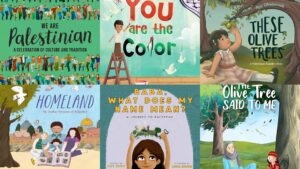Freelance writer and author Mariam Chaudhry and teacher and author Firoza Osman discuss the importance of having an open conversation about sex and relationships, respect and empowerment, with our Muslim children.
Time To Have a Little Talk About “The Talk”

“The talk”. Putting two seemingly innocent words the and talk into inverted commas transforms them into something which has universally become a taboo subject in many Muslim households. It’s talked about on the front of magazines found in newsagents, often emphasised as a marketing strategy for sales and advertisements, alluded to in increasingly more films for a younger audience where it isn’t explicitly shown and now it’s trickled into the handheld devices of our children and taught in primary schools. Let’s just say the word for what is, sex.
Now, for some people, those words hit hard and are an embarrassment to even read. But before we start uttering our “astaghfirullas” and “la hawla wa la quwwata illa billa’s”, let us remember that the Prophet Muhammad (SAW), the epitome of good character, never shied away from talking about any topic when he was approached. Separating children into different beds [1] and having them knock on a room door to ask permission before entering [2] is clearly recommended and recognises the sexual development of children.
Although there is no evidence of the Prophet (SAW) having “the talk” with any child or young person, with the escalating exposure of children and young people to social media, the world wide web, and pornography, we need a paradigm shift in how we view and when we talk about sex to our children.
Gone are the days where a basic school science lesson about puberty was adequate enough to cover all grounds on the subject. Having home educated my own children until they were seven years old I felt quite comfortable in thinking that I was in control of how much they were and weren’t exposed to. My children understood about respecting another person’s privacy and weren’t to look at or touching another’s private parts. They also admittedly had a very fairytale-like understanding of how a baby comes into this world.
Fast forward to them transitioning into school after they turned seven and they would return home with a collage of newly informed ideas discussed with their peers about growing private parts, sex and relationships, puberty, and gender identification. I would like to think that I am a pretty open-minded woman and have always allowed my children to feel that we have a pretty open relationship, but oh my, did my insides turn with my babies’ sudden intense curiosity and questions about sex and sexuality!
Alhamdulillah, I was directed to a book review on Instagram for How to Talk to your Muslim Child about Sex by Firoza Osman. I immediately bought it on kindle and downloaded it onto my laptop (well I didn’t want my ‘little ones’ discovering the paperback copy in the house did I).
How to Talk to your Muslim Child about Sex covers every topic from how to use age-appropriate language, pornography, masturbation (yep I choked when I first read that), and alcohol. It took me a few deep breaths to calm my nerves before I started reading the book but once I got into it, it was clear that Firoza, who has over 20 years of experience working with young people, wrote with compassion and understanding.
Despite the raw chapter titles on the contents page, her book is by no means crude, but is sensitive, highly informative, and I would go as far as recommending it as an essential reference guide for all parents to understand the mental and physical development of their child, the real-life issues facing the current generation of children and how to best open up and discuss these as a parent. Initially having thanked her in my heart for the excellent work that she was doing, I decided to thank her in person and reached out to her on her Instagram account halal_birdsandbees.talk with some questions and concerns from members of the Muslim community.
Here are her answers to the questions I asked on “the talk“, sexuality, and pornography:
When is the best time to start having “the talk” with your children?
“The conversation really needs to start when your kids are toddlers, it’s not sex education per se but what you are laying down is a foundation for healthy sexuality so by starting young you’re teaching your child to come to you for information,” advises Firoza, which makes sense as they are going to discover that they do have body parts which have nerve endings and are highly sensitive to touch.
“You’re starting on the road to making them become well informed, body positive. You’re also helping to protect them from predators and abuse and you’re ultimately setting them up for life with positive healthy relationships. You start by using correct terms for their genitals, and that they are private. Be sure to explain safe touch and unsafe touch, you are teaching them about consent and boundaries in that you don’t have to kiss everybody or sit on anyone’s lap if you don’t want to.” Including family members!
“You are also role modelling privacy and modesty. By the time they are 4-6 and the ‘where do babies come from’ questions start, it will already be more comfortable for you to talk on the topic. Keep it brief, honest, and factual. It can be something very simple like ‘Allah puts love between a husband and wife and when they are ready to share that love, they have a baby. One part (sperm) comes from the husband and one part (an egg) from the wife’. Your child will determine the depth you go into. Some children will be satisfied with that, others may not. You may have to add in ‘Allah made their bodies to come together in a special way for these two parts to meet and grow a baby.’ You can even say if that’s not enough that our ‘private parts are made to fit like a lock and key so the husband can release sperm which will go to an egg inside the wife and grow a baby.’ Although schools here describe intercourse in late primary school, awareness about body parts should happen earlier because of the unfortunate exposure to porn. It’s important to remember that you are explaining a natural and loving act that Allah designed, allowed within the boundaries of a committed married relationship. Starting young will also give you more time to reinforce Islamic values and boundaries.”
How do I prepare my child for what they may hear from outside sources? How should children handle inappropriate “playground talk”?
“I recently listened to a talk by a guy that goes into schools and talks about online safety and he found 8-year-olds at the school watching porn in the playground so you need to really prepare your child by having a conversation early,” emphasises Firoza.
“Not all kids will come to you with questions so sometimes you have to bring things up and certainly by that age you want to say to them that ‘you may hear the word sex at school and that’s a word that just means it is the way that Allah has made it possible for us to be able to make a baby and what you hear at school may not be the truth, so I want you to come to me so we can talk about it.’ You can decide at that point where you want to take that conversation in that moment. Our kids are exposed to inappropriate stuff every single day so empowering them by giving them information and porn proofing them is important. You can’t control everything that’s going on but if somebody in the playground is trying to show them something they know to say ‘no I don’t want to look at that’, turn away, tell an adult and come and talk to you about it when they get home. If it’s inappropriate talk, then they should also know they can say ‘I don’t want to listen to this’ and walk away.”
How would you or should you explain porn to your 10 year old in a decent way?
“Well bearing in mind that the average age of porn exposure is 8 years old inshaa’Allah this conversation will have happened before that age,” states Firoza, “If your child goes to school, uses a computer, or has a phone the risk of exposure is high. It should really just start with telling them that ‘pornography can be in the form of images, videos, cartoons where you will see people engaging in adult behaviour which is sexual and they’ll be wearing little to no clothes so you can see their private parts. It doesn’t show sex as kind and loving and private, which is how Allah made it. It’s never your fault if it pops up on the computer but it’s not for children’s eyes. Your brain may make you want to look but it will make you feel yucky. Turn away and always come and tell me if that happens.’ I explain this in my book in more detail, but this is a start. “
A lot of inappropriate exposure seems to come from devices such as computers and smartphones. Without alienating the child and taking away their privileges, what is the best and easy-to-use protective software?
“There’s a lot of good software on the market which has gotten better over the years; the one I’ve been hearing a lot about is BARK,” Firoza explained.
Other protecting software includes Boomerang and CleanBrowsing, which is free.
What can our masajids do in order to address this issue?
“What our masajids need to do is actually recognize that these are real issues that our community is facing,” Firoza stresses, “pornography addiction is real and a big problem plus we also have domestic violence, spiritual abuse, and sexual abuse. We need to lift the stigma and taboo around these topics by talking about them in khutbahs and parent workshops. Sexual and healthy relationships education should also be a part of our youth groups.”
How do we install confidence in our daughters so that they don’t associate success with being sexually desirable?
“Girls very much are defining their self-esteem through their social media accounts where they’re living these filtered lives and they’re after likes. Friendships are being determined through comments and whether you like someone’s post and photos and so on. What’s really important is from a young age to instill self-confidence and positive body image in girls so that they don’t define themselves by how they look, what they’re wearing and so on.” Firoza advises building up their self-esteem so that they can reject myths about appearance and body image being the most important assets a girl has.
“Many are unfortunately caught up with celebrity role models who are shallow and immodest. Kim Kardashian had a book out called selfies which was just all her selfies, so I mean that alone tells us like this is what people are focused on! There is a lot of research around having a good relationship with a father figure being really crucial to the self-esteem of girls. As parents, set boundaries and cut down on your daughter’s screen time; get her involved in sports and hobbies. Have one-to-one time with her to stay connected. Don’t let her hear you not be accepting of your own body. Help her cultivate good friends including those of the older generations and engage her in a spiritual life which research shows makes one feel healthier and happier.”
How can we best instill modesty in our sons, teach them to lower their gaze, and talk and behave respectfully to girls and women?
“This is very important because boys and young men are exposed to increased objectification and pornification of women in movies and in video games. Boys are not getting the right messages about treating women with respect,” says Firoza.
“Just as we talk to our daughters about modesty, we really need to instruct our sons about it as well and it’s important to teach them to lower their gaze; they should see you do that by example when something inappropriate comes on screen for example. When I used to go shopping and there were billboards with women wearing underwear or very little clothing, I would tell my kids to look away and explain that our bodies are not meant to be on public display. Allah wants us to focus on the internal not the external. It’s also important for couples to role model a respectful relationship so that your boys are also exposed to how women should be viewed and respected. Sit with them when they have their screen time so that you keep in the loop of their lives and also take the opportunity to discuss what you are seeing, the messages being given and why there may be an issue with it.”
Would you advise that fathers give “the talk” to boys and mothers to girls or does it not make a difference which parent speaks with the child?
“Ideally fathers should be speaking with their boys and mums with their girls, but I think there should also be overlap with conversations about porn and relationships because it’s good to get the other gender’s perspective. It’s better to start with the same-sex parent or another trusted relative or adult mentor if need be because it will most likely be most comfortable this way. But if the relationship with the parent of the opposite gender is good then it can be just as effective with the opposite gendered parent.”
How do we approach the concept of abuse and grooming without scaring children?
“You won’t scare your children if you start when they’re young by teaching them that their privates shouldn’t be touched or seen by anyone unless it’s a parent giving you a bath or briefly cleaning you after the toilet or the doctor with the parent’s consent,” Firoza reassures, “it’s also important to never use the word secret with them because that’s the language of groomers. Rather use the word surprise, for example, we will keep your sister’s birthday present a surprise. Remind them we don’t keep secrets. Tell them ‘it can be confusing when the person who touches your private parts or asks you to touch theirs is a family member or friend that has cared about you. They may do it in a gentle way, buy you presents and make you feel it’s special between you two. They know it’s wrong and will tell you not to tell anyone but it’s really important that you tell someone you trust right away. Some people don’t like talking about it, but you will feel better if you do because you have done nothing wrong.’ All of these things, using proper words, talking about safe/unsafe touch, explaining grooming, is not going to scare your children but rather empower them. It’s also important to have a tech plan for responsible digital use in place for your family and that your children know that there are people that are online who pretend to be kids. This is where you have to be involved with what’s happening with their social media use and so on.”
How do mothers approach the topic of puberty with their teenage boys when their father is unwilling to do it?
“Well, if one parent is not willing to do that talk about puberty, then the other parent or a trusted adult or mentor can start. There are lots of good books around to start the process and then pick up the conversation from there. Always remember certain principles like Islam takes a positive approach, so we want to be saying things like ‘isn’t it amazing how Allah has designed our bodies to become grown-ups and be able to have a child, and so on.’ It’s also important to make our sons aware of the bodies of girls and they should be made aware of periods and tampons/sanitary towels because one day they may have daughters and we want to reduce the stigma about a very natural function.”
How do we talk to our children about LGBTQ without othering and using terms like ‘normal, natural, abnormal’ etc?
“The best way really to talk about LGBTQ issues is to have an honest conversation. If no conversations are being had, then the non-Islamic views get taken on. LGBTQ characters in movies, TV shows, and books, including children’s ones, have become common so it can’t be avoided. While Islam doesn’t accept acting on homosexual feelings or gay marriage, focus on the fact that it does teach us to be respectful of other’s beliefs even when they are different to our own. There are people that are attracted to people of their own gender and they sometimes get married to them because it’s allowed in this country. There are also some people that may be born a girl but don’t feel like a girl inside and wish to have surgery to change their gender. We don’t know why this happens and there are different ideas about why this happens. Allah is our Creator and has made it clear that we do not act on homosexual feelings, going against the purpose of our creation. People who are LGBTQ can sometimes get bullied so it’s important that we always stand up for anyone that is getting bullied. It’s important from a young age to affirm your child’s gender by encouraging their identification with the same-sex parent or suitable role model and for them to have affection from both parents, where possible, to strengthen it.”
For more advice on how to deal with current issues facing children and adolescents, parents, carers, and tips on how to be proactive over reactive with such issues, follow Firoza on halal_birdsandbees.talk.
How to Talk to your Muslim Child about Sex by Firoza Osman is available on Amazon in paperback and kindle.
REFERENCES
1. “Teach your children to pray when they are seven years old and reprimand them if they do not do so when they are ten years old, and separate them in their beds.” Narrated by Ahmad, 6689; Abu Dawood, 495.
2. “O you who have believed, let those whom your right hands possess and those who have not [yet] reached puberty among you ask permission of you [before entering] at three times: before the dawn prayer and when you put aside your clothing [for rest] at noon and after the night prayer. [These are] three times of privacy for you. There is no blame upon you nor upon them beyond these [periods], for they continually circulate among you – some of you, among others. Thus does Allah make clear to you the verses; and Allah is Knowing and Wise” (Quran, 24:58).
ABOUT THE AUTHORS
Mariam Chaudhry is a mother to three children and spent 7 years homeschooling them before pursuing her own dreams of writing. She is a freelance writer, content writer, ghostwriter and also writes children and middle-grade books, one of which is due to be published in summer 2021 inshAllah. Mariam adores nature, enjoys self-development, and loves learning about history, culture, and language. Instagram:@positively_mariam Email: mariam_chaudhry@hotmail.co.uk
Firoza Osman has over 20 years of teaching experience with youth and adolescents, working as a Further Education lecturer in the UK, Educational Assistant with a public school board, and Afterschool Program Manager for a Canadian Islamic non-profit organization delivering workshops to Muslim youth on Healthy Relationships. She has two adult sons in the UK and resides with her husband in Edmonton, Canada. Instagram: halal_birdsandbees.talk. and https://www.facebook.com/authorFirozaO.


